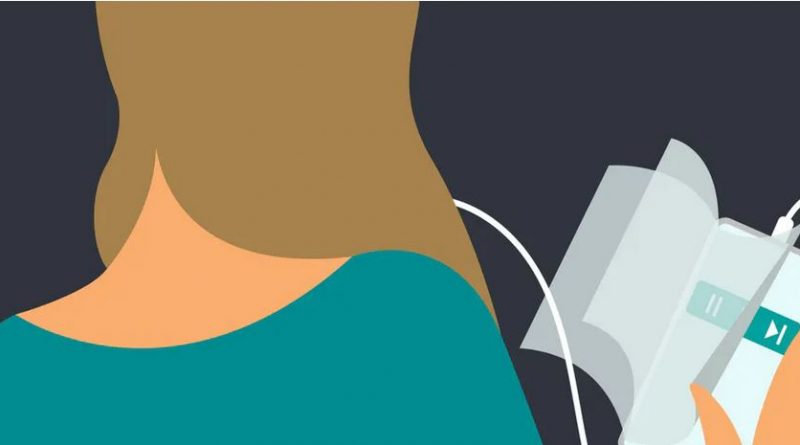Yes, Audiobooks Are Real Reading. Here Are the Best Ones for Kids.
Tucked in, snuggled up, I still remember the hours I spent listening to my mother read aloud “The Hobbit.” I must have been about 8-years-old, and while I was a pretty strong reader, the complexity of that text (and certainly its length) would have made the story inaccessible to me. I hung on every word, fascinated by these new characters, blissfully lost in a whole new world.
As a preschool and elementary school librarian, I’ll tell you that there’s nothing more foundational for literacy than time spent snuggled up with a trusted adult, soaking in a story, sharing the words, laughing (or crying) and learning to love the way the words unfold in a well-told tale.
Recorded books may lack the lap and snuggles, but they definitely have their perks, and audiobooks have come a long way from the simple books-on-tape of years gone by. They have evolved a true experience through the use of talented narrators, well-chosen sound effects, and the integration of music.
- “The Invention of Hugo Cabret” by Brian Selznick, in print, is a masterpiece of incredible illustration interwoven with a rich story. When I saw that there was an audiobook version, I couldn’t imagine how it could capture the richness of the setting, and yet, it delivers.
- “Echo” by Pam Muñoz Ryan has a full cast of narrators to deliver rich characterization (Mark Bramhall, David de Vries, MacLeod Andrews and Rebecca Soler), but also pulls in the music that is so central to the story.
- “Unbound: A Novel in Verse” by Ann E. Burg is narrated by Bahni Turpin who brings to the work talent for dialect and understanding of character voices that simply make this version sing.
- “Wedgie and Gizmo” by Suzanne Selfors is narrated by Johnny Heller and Maxwell Glick and is a laugh-out-loud funny tale. After I listened to this one, I read the other books in the series in the narrators’ voices in my own head. So much more fun than my own voice!
Personally, I am over-the-moon excited when an author narrates their own book. It feels more like a conversation with them, a sharing of their work, a peek inside their thoughts. Listening to an author read their own words with their own inflection and feeling gives me an insight into how those words sound in their own head. For young readers, I think it also brings to life the idea that a real person wrote those words. The mystical and magical aura of “author” is set aside, allowing kids to realize that ordinary people write books. Sure, some of those ordinary people have a tremendous talent for writing, but when kids realize that authors are mere mortals, they can then see themselves in that role as well.
- “Long Way Down” by Jason Reynolds
- “Rebound and Crossover” by Kwame Alexander
- “Coraline” by Neil Gaiman
While fiction seems to have a stronger hold on the audiobook production schedule, there are plenty of nonfiction memoirs, biographies, and autobiographies that make for powerful listening.
- “Brown Girl Dreaming” by Jacqueline Woodson is a beautiful memoir, written in verse. It’s read by the author, making it feel much like listening to someone share anecdotes and wisdom from their own life.
- “Martin’s Big Words: The Life of Dr. Martin Luther King, Jr.” by Doreen Rappaport is narrated by Michael Clarke Duncan whose rich voice lends an air of deep reverence for Dr. King and his legacy.
- “Chasing Lincoln’s Killer” might be one of my all-time favorite listens. Will Patton’s voice just drew me in, and the fact that he was the one to pronounce some tricky names, meant that I didn’t get hung up on that, and simply enjoyed the unfolding of events in the days after President Lincoln’s assassination.
Sadly, some educators and parents seem to perceive audiobooks as less than worthy. It is as if, in their minds, sound media doesn’t provide the same “rigor” that print media does. I have heard educators insinuate that listening to an audiobook is somehow like cheating. I even once had a teacher say to me, “Audiobooks aren’t real reading, they’re just entertainment.” As I respectfully disagreed with my out-loud voice, my inner voice thought “Isn’t that what books are supposed to be for children? Being entertained by a good book is my GOAL for them!”
I would argue that audiobooks are most definitely reading, offering rigor of a different sort and that these types of materials not only provide a path to story and information for kids who have visual impairments, dyslexia diagnoses or learning disabilities, but that they are powerful learning tools for all of us.
Listening to an audiobook requires a different kind of focus; it’s all about listening actively. And for those for whom traditional text comprehension is elusive or presents a struggle, audiobooks open up a whole world of possibilities for enjoying amazing literature. Their minds grow while exploring interwoven plotlines, character development, story arcs and themes. These concepts and constructs, so critical to growth as a reader, would likely be beyond their reach if they are only permitted to interact with the work through print.
Listening to an audiobook, especially while being able to follow along with a print copy, increases fluency for some students. And last but certainly not least I have found that students have the confidence to explore new genres in an audiobook format because their upfront investment of reading ability is lower. They soak up new vocabulary, improve their visualization skills and engage with above-grade-level texts.
Audiobooks are for everyone—the busy professional who wants to enjoy a story on their commute, an active kid who can’t (or won’t) sit still but who loves an adventure, a struggling reader who just wants to know the same stories her peers do.
My elder son is an active type of kid and not much of a reader. When we would listen to an audiobook as we ran errands as a family, and pulled into the grocery store parking lot in the middle of a chapter, he would beg for us to sit in the car until the chapter wrapped. He hung on every word. We bonded as a family over those stories, and my boys will tell you to this day that those are some of their favorite memories of childhood.
Let’s give all our students the chance to hang on to the words of a talented narrator, to get lost in a world that is new to them, or to revel in the twists and turns of an adventure. After all, it’s entertainment that is truly good for them.
Source: https://www.edsurge.com/news/2021-02-16-yes-audiobooks-are-real-reading-here-are-the-best-ones-for-kids




